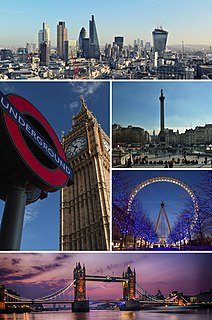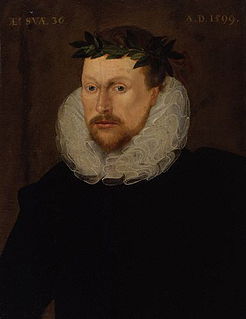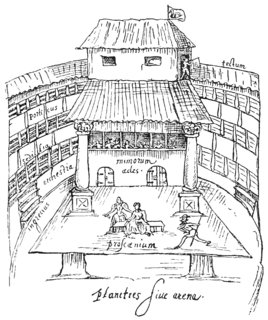This article includes a list of references, but its sources remain unclear because it has insufficient inline citations .(September 2016) (Learn how and when to remove this template message) |
The King's Revels Children or Children of the King's Revels were a troupe of actors, or playing company, in Jacobean era London, active in the 1607-9 period. They were part of a fashion for child actors that peaked in the first decade of the seventeenth century, with the Children of Paul's and the Children of the Chapel.
In Renaissance London, playing company was the usual term for a company of actors. These companies were organized around a group of ten or so shareholders, who performed in the plays but were also responsible for management. The sharers employed "hired men" – that is, the minor actors and the workers behind the scenes. The major companies were based at specific theatres in London; the most successful of them, William Shakespeare's company the King's Men, had the open-air Globe Theatre for summer seasons and the enclosed Blackfriars Theatre in the winters. The Admiral's Men occupied the Rose Theatre in the 1590s, and the Fortune Theatre in the early 17th century.

The Jacobean era refers to the period in English and Scottish history that coincides with the reign of James VI of Scotland (1567–1625), who also inherited the crown of England in 1603 as James I. The Jacobean era succeeds the Elizabethan era and precedes the Caroline era, and is often used for the distinctive styles of Jacobean architecture, visual arts, decorative arts, and literature which characterized that period.

London is the capital and largest city of both England and the United Kingdom. Standing on the River Thames in the south-east of England, at the head of its 50-mile (80 km) estuary leading to the North Sea, London has been a major settlement for two millennia. Londinium was founded by the Romans. The City of London, London's ancient core − an area of just 1.12 square miles (2.9 km2) and colloquially known as the Square Mile − retains boundaries that follow closely its medieval limits. The City of Westminster is also an Inner London borough holding city status. Greater London is governed by the Mayor of London and the London Assembly.
Contents
The King's Revels Children are sometimes called the King's Revels Company, though this title leaves them liable to be confused with a similarly named troupe, primarily of adult actors, most active in the years around 1630. To avoid this confusion, some scholars prefer to identify the early company specifically as a company of children, and to call the later group the King's Revels Men. [1]
The King's Revels Men or King's Revels Company was a playing company or troupe of actors in seventeenth-century England. In the confusing theatre nomenclature of that era, it is sometimes called the second King's Revels Company, to distinguish it from an earlier troupe with the same title that was active in the 1607-9 period. Since the earlier group was a company of boy actors, they are alternatively referred to as the King's Revels Children, while the later troupe is termed the King's Revels Men.
The King's Revels Children were founded in 1607 by a partnership between the poet and playwright Michael Drayton and Thomas Woodford, nephew of the playwright Thomas Lodge, who later sold shares in the enterprise and took on other partners. The boys acted at the Whitefriars Theatre in London (Woodford was one of the theatre's leaseholders), performing the same type of repertory as the other child companies of the day. The Children of Paul's had ceased active dramatic performance a year earlier, in 1606; some scholars have theorized that the King's Revels Children absorbed some personnel from the Children of Paul's, though this cannot be said with certainty. William Barkstead, a playwright, poet, and actor who later worked with the Lady Elizabeth's Men and Prince Charles's Men, may have begun his career as a boy actor with the King's Revels Children.

Michael Drayton was an English poet who came to prominence in the Elizabethan era.
Thomas Lodge was an English physician and author during the Elizabethan and Jacobean periods.

The Whitefriars Theatre was a theatre in Jacobean London, in existence from 1608 to the 1620s — about which only limited and sometimes contradictory information survives.
The company seems to have run into financial problems quite early in its existence, with the result that its plays were sold off to printers —; something that theatre companies of the era generally avoided, since publication diminished the unique value of their basic assets, their plays. The company's financial state worsened, and it collapsed in litigation among its investors by 1609.
Despite its short life, the King's Revels Children acquired an interesting repertory of plays in their active years. The plays below were published as having been acted by the King's Revels Children; they are listed with year of first publication, and date of entry into the Stationers' Register where available.
The Stationers’ Register was a record book maintained by the Stationers' Company of London. The company is a trade guild given a royal charter in 1557 to regulate the various professions associated with the publishing industry, including printers, bookbinders, booksellers, and publishers in England. The Register itself allowed publishers to document their right to produce a particular printed work, and constituted an early form of copyright law. The Company's charter gave it the right to seize illicit editions and bar the publication of unlicensed books.
- Cupid's Whirligig, Edward Sharpham; licensed 29 June 1607; printed 1607
- The Family of Love, Thomas Middleton; 12 October 1607; 1608
- Humour Out of Breath, John Day; 12 April 1608; 1608
- The Dumb Knight, Gervase Markham and Lewis Machin; 6 October 1608; 1608
- Every Woman In Her Humour, Lewis Machin?; 1609
- The Two Maids of Moreclack, Robert Armin; 1609
- The Turk, John Mason; 10 March 1609; 1610
- Ram Alley, Lording Barry; 9 November 1610; 1611.
Cupid’s Whirligig, by Edward Sharpham (1576-1608), is a city comedy set in London about a husband that suspects his wife of having affairs with other men and is consumed with irrational jealousy. It was first published in quarto in 1607, entered in the Stationer’s Register with the name "A Comedie called Cupids Whirlegigge." It was performed that year by the Children of the King’s Revels in the Whitefriars Theatre where Ben Jonson’s Epicene was also said to have been performed.
Edward Sharpham was an English playwright and pamphleteer.
The Family of Love is an early Jacobean stage play, first published in 1608. The play is a satire on the Familia Caritatis or "Family of Love," the religious sect founded by Henry Nicholis in the 16th century.
Day's Humour Out of Breath contains a possible allusion to Shakespeare's Timon of Athens that helps to date the latter play.

William Shakespeare was an English poet, playwright and actor, widely regarded as the greatest writer in the English language and the world's greatest dramatist. He is often called England's national poet and the "Bard of Avon". His extant works, including collaborations, consist of approximately 39 plays, 154 sonnets, two long narrative poems, and a few other verses, some of uncertain authorship. His plays have been translated into every major living language and are performed more often than those of any other playwright.

Timon of Athens is a play by William Shakespeare, probably written in collaboration with Thomas Middleton in about 1605–1606, which was published in the First Folio in 1623. It is about the fortunes of an Athenian named Timon. The central character is a beloved citizen of Athens who through tremendous generosity spends his entire fortune on corrupt hangers-on only interested in getting the next payout.

